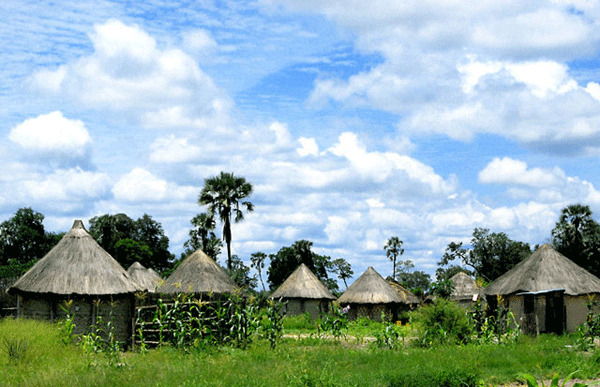We have made our way through Namibia’s offerings of ecologically sustainable safari destinations, as listed in the David Bristow and Colin Bell’s publication, Africa’s Finest, and now our focus shifts to Botswana’s Okavango Delta, nicknamed the “sea of land, land of water”. South Africa’s northern neighbour consists of such diversity that this one country is home to a wilderness of waterways, bulging rivers and vast desert.
The Delta is one of the most treasured places on the planet and is indeed listed as one of the Seven Natural Wonders of Africa. It is home to an astounding variety of animals, seasonally reaching a count of around 200 000 mammals when the rains lure the migratory species in to drink and feed. An animals that typifies the Delta plains is the water-specialised antelope, the Lechwe. Herds of the rusty-red buck seem to skim across the shallow swamp waters making for an incredible contrast of colour against the green reed beds. Another unusual antelope found in Botswana is the sitatunga, possessors of water-proof coats and a defensive behaviour that takes them into the water where they are seen wallowing in pools with only their nostrils keeping above the surface. Elephants are aplenty, as are buffalo and hippo; lions take to the water in order to stalk and catch prey; and African wild dogs hunt here in one of their population strongholds.
The Delta is a vast, yet sensitive labyrinth of intricate waterways and reed beds. There are approximately 80 safari lodges drawn to the area known for its wildlife viewing luxury and natural beauty. It is important that the tender environment is preserved for those that need it and that we can continue to visit for years to come. At Delta Camp, the preservation of the land, the conservation of its wildlife and the prosperity of the local people are top priority. The camp has existed in this spot for 30 years, making it one of the pioneering accommodations in the area.
Passionate owner and true soul of the earth, Peter Sandenbergh, is more interested in developing the natural charm of the lodge and fitting in as unobtrusively to the landscape as possible, than he is in keeping such luxuries as ice in the bar! Although there is ice available to keep drinks cool, the damaging effects of a frequently visiting delivery truck is something Delta Camp tries to avoid. Reed chalets, raised on wooden stilts can be as easily removed as they were constructed, leaving little to no impact on the Okavango island floor. The views from the beautifully furnished, open-sided ‘treehouse’ bedrooms are spectacular. Two river channels, the Boro and Metsematsweu are overlooked from the casual bush suites and from the main dining and lounge area – the only part of the camp that has used cement in the floors.
With Botswana’s spoiling variety of game, guests need not go very far to spot their favourite bird species or to catch a glimpse of a Big Cat predator. Lion, leopard and wild dog have all been spotted from the lodge deck. The famous mokoro, or dug-out canoe, safaris are well practised in the Okavango, but what sets Delta Camp apart is that this, and walking safaris, are the only types of game activities offered. It is truly a nature lover’s utopia without the impact of any motorised transport and with only solar powered lighting and hot water. All staff are local Botswanans and all resources used to build and furnish the lodge come from the local village, providing employment and business in the community.
Everything is recycled and nothing is permanent, but the comforts of a tranquil holiday are firmly in place.







